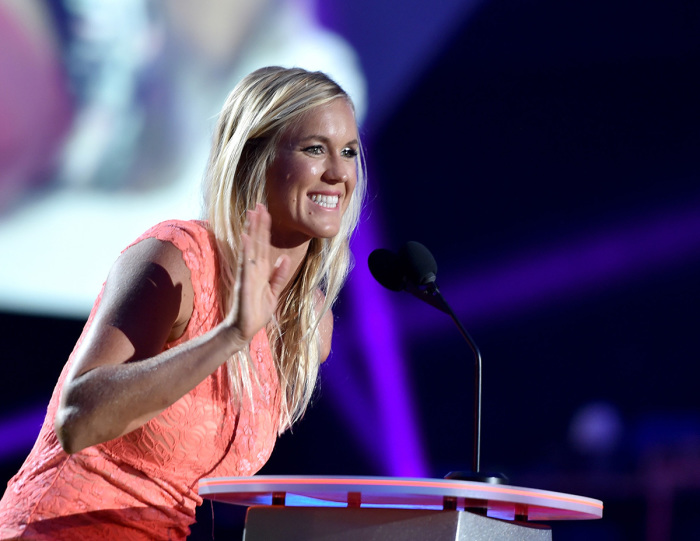Bethany Hamilton sparks outrage over 'anti-trans' views ahead of Wisconsin event

A noted professional athlete’s presence at an upcoming event in Wisconsin is drawing blowback due to her opposition to allowing trans-identified males to compete in women’s sports.
Bethany Hamilton, a professional surfer who lost one of her arms in a shark attack and was the subject of the film “Soul Surfer,” is slated to appear at the Women’s Fund of the Oshkosh Area Community Foundation’s annual “Power of the Purse” fundraising event in Oshkosh on May 9. According to the group’s website, “The mission of the POP event is to continue raising awareness, advocacy, and funds for women and children who are underserved in our community.”
Hamilton’s presence at the upcoming event did not sit well with “members and allies” of the LGBT community, as more than 200 individuals and organizations signed a letter opposing the decision to feature her as the keynote speaker. The letter, dated Jan. 15, defined Hamilton’s planned appearance at the event as a “serious problem.”
“For those who may not be aware, Bethany Hamilton announced in February 2023 that she refuses to compete in World Surf League events in response to their decision to adopt the International Surfing Association (ISA) policy on transgender participation,” the letter stated. The policy allows trans-identified male athletes to compete against women in sporting events.
The letter characterized Hamilton’s opposition to allowing trans-identified male surfers to compete against women as contrary to the Women’s Fund’s mission to “improve the lives of women, girls and all members of the communities of Winnebago County through philanthropy, grant making and education.”
The document claims that “there are no transgender athletes competing in the World Surf League, and only one transgender athlete, Australian longboard surfer Sasha Jane Lowerson, has ever won a professional surfing competition.”
“Bethany Hamilton’s boycott is not motivated by concerns about athlete safety or maintaining the integrity of a professional sport. Bethany Hamilton simply does not personally want to accept transgender women as women,” the letter continued.
The activists further claimed that inviting Hamilton to the event “creates and enhances a direct platform for amplifying anti-transgender bigotry in our own backyard.” They described Hamilton’s declaration that trans-identified male athletes should not compete against female athletes as “blatantly exclusionary and harmful toward transgender women athletes and, by extension, the trans and nonbinary community at large.”
“They directly promote and encourage more of the same divisive rhetoric and atmosphere that contribute to our state’s dire mental health statistics for LGBTQ+ youth. That fact cannot be ignored, regardless of any personal religious beliefs she may hold, any philanthropic work she performs in other areas, or any dollar figure in ticket sales and publicity her celebrity status might attract.”
The letter expressed disappointment that the Oshkosh Area Community Foundation has elected to stand by Hamilton thus far: “The Women’s Fund of the Oshkosh Area Community Foundation remains committed to valuing money and fame over the safety, well-being, dignity, and equality of transgender youth and adults.”
The signatories also maintained that “a decision to platform and promote a self-avowed trans-exclusionist is an unacceptable choice for any organization to make, but most especially a community-funded nonprofit that claims to be supportive of ‘all women and girls.’”
Additionally, the letter lamented that “Discover Oshkosh, the culture and events arm of the Oshkosh Convention and Visitors Bureau, is also promoting Bethany Hamilton’s selection as ‘Power of the Purse’ keynote speaker on their Facebook page.”
The signatories called on the Women’s Fund of the Oshkosh Area Community Foundation to “rectify this harmful mistake by taking all possible steps to remove and replace Bethany Hamilton as ‘Power of the Purse’ keynote speaker, and for Discover Oshkosh to stop promoting this event until those efforts are made.” They also called on both organizations to make a “public and sincere apology to the LGBTQ+ community for this harmful mistake.”
Hamilton is not the first high-profile athlete to express concerns about allowing men who identify as female to compete in women’s sports. Female athletes who have lost competitions to trans-identified males, such as track athlete Selina Soule and swimmer Riley Gaines, have also emerged as outspoken critics of policies allowing trans-identified athletes to play on teams that align with their self-declared gender identity.
Fairness concerns also focus on the biological differences between males and females that give male athletes an advantage over their female counterparts in athletics. USA Powerlifting, which has a policy in place requiring athletes to compete on teams that align with their biological sex rather than their stated gender identity, identifies advantages enjoyed by male athletes as “increased body and muscle mass, bone density, bone structure, and connective tissue.”
A 2020 study from the British Journal of Sports Medicine found that trans-identified male athletes maintain an advantage over their biologically female counterparts even after two years of taking feminizing hormones. Concerns about fairness for female athletes have prompted several states to take action to ban trans-identified males from competing in women’s sports.
Currently, 24 states have passed laws and/or regulations requiring athletes to compete on teams that correspond with their biological sex as opposed to their stated gender identity: Alabama, Alaska, Arizona, Arkansas, Florida, Idaho, Indiana, Iowa, Kansas, Kentucky, Louisiana, Mississippi, Missouri, Montana, North Carolina, North Dakota, Oklahoma, South Carolina, South Dakota, Tennessee, Texas, Utah, West Virginia and Wyoming.
Ryan Foley is a reporter for The Christian Post. He can be reached at: [email protected]




























